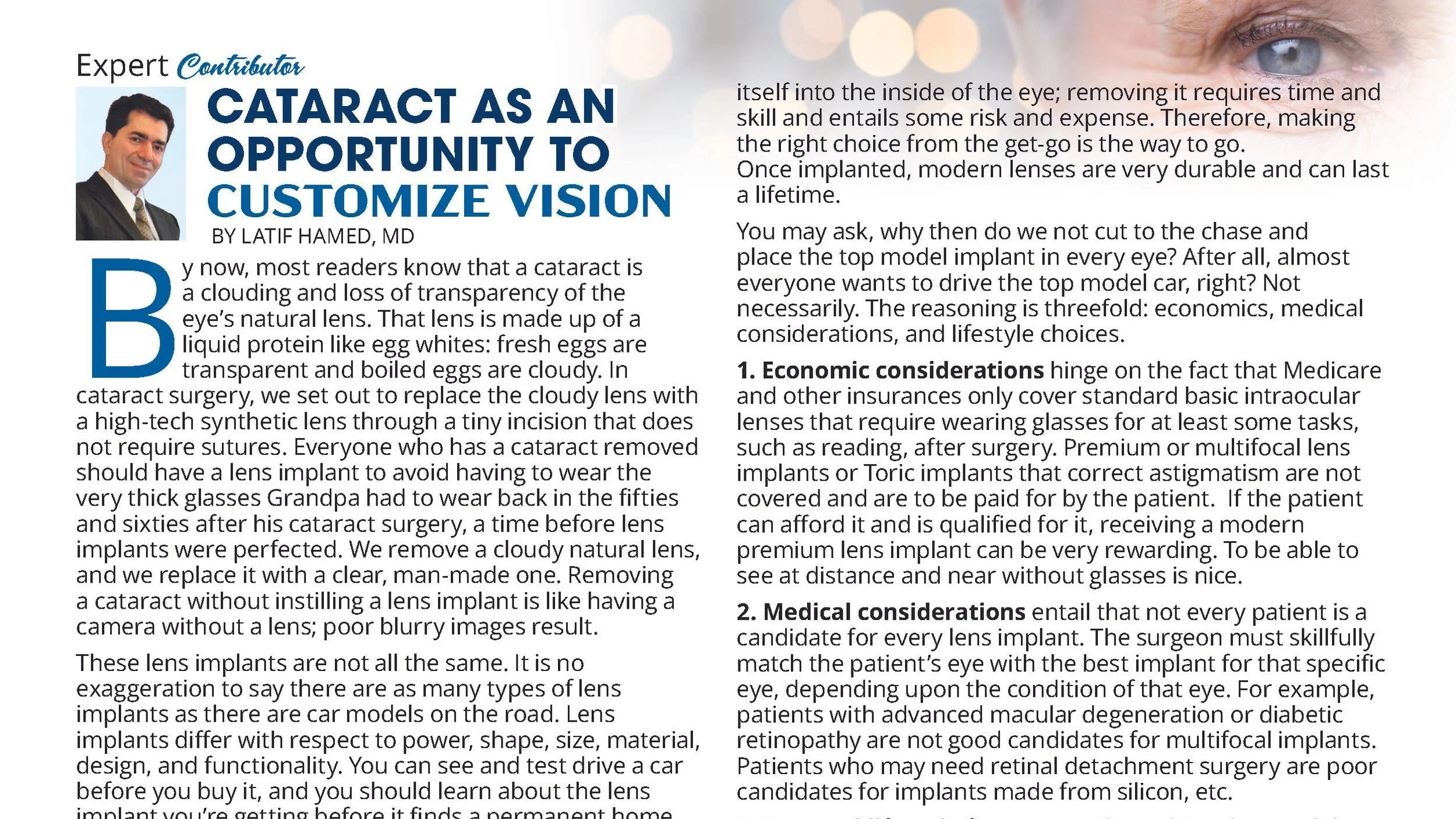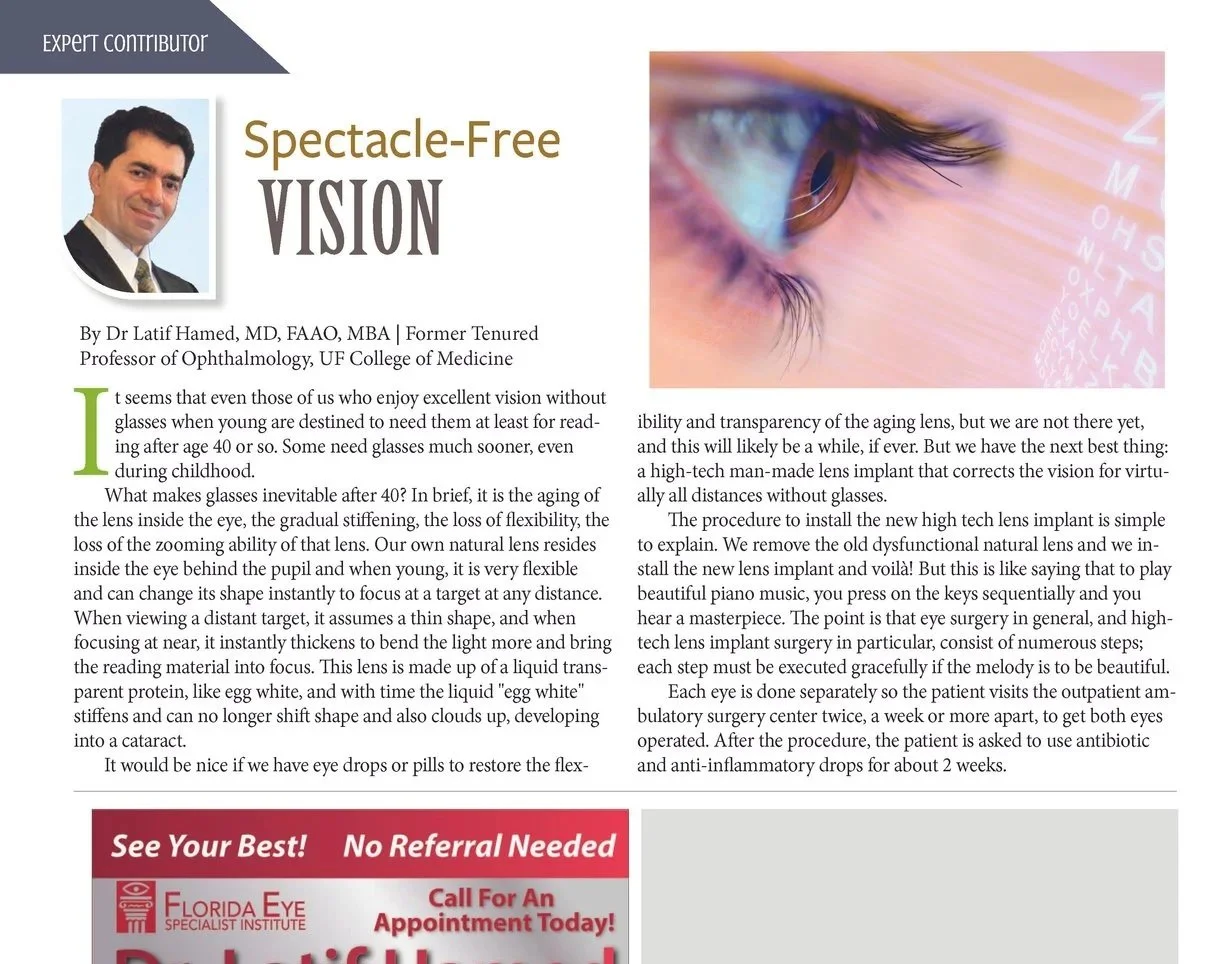
Cataract surgery at Florida Eye Specialist Institute
Cataract surgery with the CATALYS LASER
The CATALYS LASER was specifically developed to perform certain steps of CATARACT surgery with LASER precision. The laser uses computer guided imaging with over 10,000 scans to produce a highly detailed and customized image of your eye which forms the basis for the treatment plan.
Everything You Need to Know About Cataracts—Made Simple
-

Intraocular Lens Implants: The Inside Story
-

Cataract As An Opportunity to Customize Vision
-

Cataract Surgery: Journey from A to Z
-

Spectacle-Free Vision
Frequently Asked Questions
-
Will I need glasses after cataract surgery?
That depends on the type of lens you choose. Standard lenses restore clear vision at one distance (usually far), while premium multifocal or EDOF (extended depth of focus) lenses can reduce and usually eliminate your need for glasses for near, intermediate, and distance vision.
-
How do I know if I have a cataract?
Common signs include cloudy or blurred vision, glare or halos around lights (especially at night), faded colors, and frequent changes in your glasses prescription. A comprehensive eye exam is the only way to confirm if you have a cataract.
-
When should I consider cataract surgery?
You should consider cataract surgery when blurry vision begins to interfere with your daily activities—like reading, driving, or recognizing faces. There’s no need to rush, but there’s also no reason to wait once your cataracts start affecting your quality of life.
-
How long do the results of cataract surgery last?
Once removed, cataracts do not come back, nor will your new lens will not cloud again. In some patients, a thin membrane behind it can become hazy over time. It just takes a simple, one-time laser procedure (YAG laser capsulotomy) to clear this away in clinic.
-
What is recovery like after cataract surgery?
Long gone are the days when patients were asked to remain on bedrest after cataract surgery. Modern cataract incisions are so small that patients can get back to most of their usual daily activities the next day. We do ask patients to avoid certain activities like heavy lifting, swimming, fishing etc. that can lead to contamination of the operative eye. You’ll also use prescription eye drops that aid in healing and infection prevention.
-
What lens implant should I get?
No two pairs of eyes are alike- choosing the perfect intraocular lens implant requires a thorough evaluation and discussion with your doctor taking into account your lifestyle and preferred activities. When asking yourself what lens to get, what you should really be asking is: What’s best for my lifestyle, vision goals, and comfort?
-
Is there any downside to choosing a premium lens implant?
In the vast majority of cases, premium multifocal or extended depth of focus lenses help patients to achieve spectacle-independence in their daily lives. However, in patients with significant eye disease, these lenses may decrease contrast sensitivity. Some patients may notice glare and haloes in the first weeks after cataract surgery with a multifocal lens, however in the vast majority of patients these symptoms have faded significantly or completely by 3-6 months. The brain’s natural process of neuroadaptation helps you adjust to the new visual system.
Understanding your Lens Options
Basic
This option is best for patients who have visually significant cataracts, but don’t mind wearing glasses.
Astigmatism-correction
This option is best for patients with significant corneal astigmatism, which can cause image warping and blurry vision at all distances. Low astigmatism can be corrected with carefully constructed incisions in the cornea, while more significant amounts of astigmatism can be corrected with custom-shaped Toric IOLs. The CATALYS allows for LASER precise correction of astigmatism.
Premium
This is the best option for most patients. Patients who choose this option are able to function without glasses for the majority of their daily activities, including reading, applying makeup, playing golf, driving, and so much more. This category includes Multifocal and Extended Depth of Focus Lenses. Not all patients qualify for this category of lenses- certain preexisting eye conditions can decrease the likelihood of success. Your surgeon will carefully evaluate your eye and help choose the best option for you.



